Podcast: Download (Duration: 54:08 — 43.4MB)
Subscribe: Spotify | TuneIn | RSS | More
In today's show, I talk about my lessons learned from Thrillerfest 2017 on balancing ambition and contentment, the current publishing and book marketing environment, writing craft tips, the ethos of the working writer, and more.
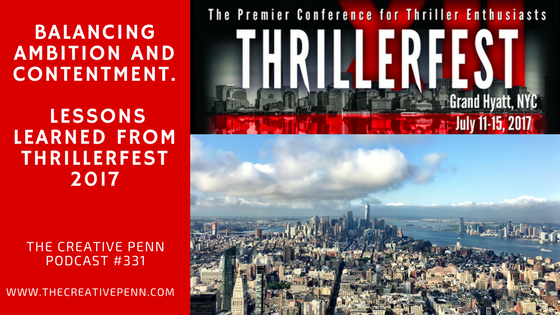
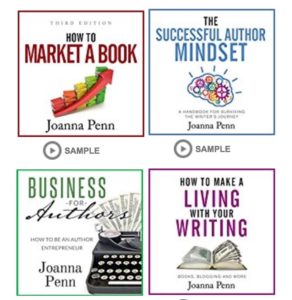
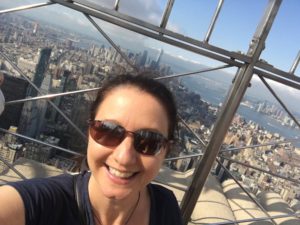
Today's show is presented by me, Joanna Penn (writing fiction as J.F.Penn).
You can listen to today's show above or on iTunes or Stitcher or watch the video here, read the notes and links below. Click here to see my photo album of the trip.
Balancing Ambition and Contentment. Lessons Learned from Thrillerfest 2017
Today’s show is a bit different as I am giving a round up of my 10 days in New York City. I was there for Thrillerfest, the annual conference of the International Thriller Writers but we also had a few days sightseeing as well. These are some of my thoughts on the trip and a big hello to the listeners of the show that I met there 🙂
[NB: These points are from my handwritten notes so there may be some error in reporting.]
(1) Balancing ambition and contentment is a never-ending task!
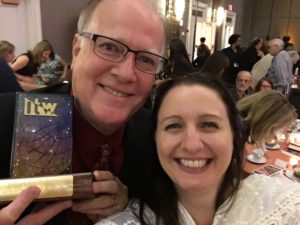
So first of all, I didn’t win the award for Best Ebook Original. James Scott Bell won, a great thriller writer and many of you will know him for his fantastic craft books. Jim is a hybrid author and a supportive member of the indie community, so it’s awesome that he won. And after all, how could I compete with a writing teacher!
You can listen/watch/read to an interview with James Scott Bell on writing discipline and mindset here.
The awards topped off a weird week for me. I spent a lot of it with chronic anxiety – what if I won? Should I immediately use that as a springboard to pitch agents, or do some kind of press release? What if I lost? Should I enter again? Should I try and win other awards? What did an award mean anyway? Was I really so insecure that I needed the external validation of an award? And on and on … 🙂
When I didn’t win, it was almost a relief, because I didn’t have to go on stage and give a speech in front of several hundred top thriller writers. But of course, I was also hugely disappointed, because I REALLY wanted to win. Awards are validation that our writing is getting better, and I’m taking the nomination as a sign that I’m on the right track.
Thrillerfest is always complicated for me and it generally sends me into a bit of a tail-spin.
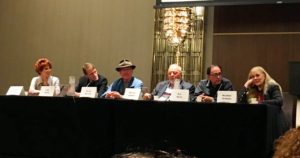
On the one hand, it makes me dream of the lottery ticket that is traditional publishing mega-success because so many authors there are big names with big deals. I go through the usual imposter syndrome and extreme comparisonitis, and then an overwhelming desire to make it to the A-list table which means I start wanting an agent and a traditional publishing deal.
It’s like there are two of me. The introverted creative who wants to stay home and write in the quiet, to live simply, to practice yoga, walk along the canal, and build a long term career slowly by publishing the books I want to write and being in control of it all through my happy indie way. That side of me is an artist who values craft and is content with the satisfaction of producing a new book in the world.
Then there’s the other me who wants excitement and awards and cocktails and parties and applause and a seven-figure deal with TV and film and games and everything! Thrillerfest taps into this ego-centric part of me – but perhaps that’s normal. As writers who publish our words into the world, we all have to balance massive ego and crippling self-doubt, which I wrote about in The Successful Author Mindset.
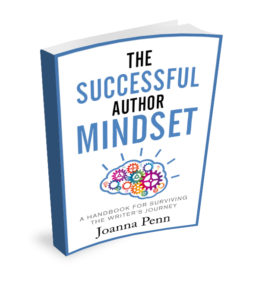
Sandra Brown, romantic suspense author of 68 New York Times bestsellers said, “I don’t feel as if I am ever quite there. I live daily with the fear that I will never write another word.”
Heather Graham, award winning author of over 200 novels said, “I’m still waiting.”
David Morrell, author of First Blood, which became Rambo, who has won pretty much every award going with forty plus years as a writer said, “I’m stricken with inadequacy.”
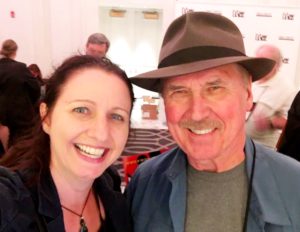
And is there ever really a ‘top of the pile’?
I went to a panel on switching publishers and bestseller lists and listened to some very big names discussing how unfair the New York Times list was and how they had to keep trying different things to make it to #1 over and over again. One of the authors (who shall remain nameless) talked about sending people out on launch day into bookstores throughout the country to buy his hardbacks, then moaned a few minutes later about how self-published authors are getting reviews so soon on launch!
They discussed the honeymoon phase with a publisher and then the sales plateau moment when moving publishers can help to get fresh eyes and fresh energy involved. And to keep the money coming in. It was interesting because they sounded just like indies do when discussing the charts and money 🙂 Lisa Gardner said “This stuff will drive you crazy. Find the things that make you happy in your creative life.”
A number of them talked about the curse of the huge advance because they are so hard to earn out and it means the next contract is tougher. I also talked to a couple of authors who were doing really well in traditional publishing a few years ago, but now the money is a lot less. If the publisher moves the publication date, then the author doesn’t get paid that chunk of money and it’s out of their control. Many authors are looking at what they can do with indie, but the conference, in general, was a very traditional publishing focused zone this year.
So after all that angst, I return to my own definition of success, which has always been freedom.
Freedom of time, to never have to work for someone else again. I was even more aware of this when passing by the huge

skyscrapers on 6th Avenue that looked like a server farm, wondering how many of those who filed in every day were happy.
Freedom (to me) also means earning enough to live a good life, to support my family and travel when I like. I also measure my life by what I create, which means writing and producing and aiming to stay separate from the outcome of what happens after the creation is in the world. I’m actually living that life now, so I am content. But perhaps we all need a streak of ambition!
(2) The ethos of the working writer
I love going to Thrillerfest because the ethos is all about authors teaching authors and helping new writers. ITW is very welcoming to new writers, however they publish, and I have only ever had encouragement from the authors I’ve met there.
Lee Child was honored as ThrillerMaster this year, an award for those with over 20 years in the industry who make a significant impact in the field. He also taught a Masterclass, a full day session with a load of new writers, plus he spoke multiple times at the conference. He doesn’t have to, he’s rolling in it, but he continues to give his time and tries to help others.
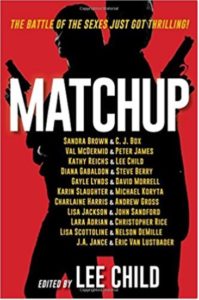
This is the same ethos that we have in the indie community, at least that part of the internet that I live in! So let’s continue to share, to help other writers through our books and events and podcasts and Facebook Groups.
It was also interesting to note the difference between questions asked by new writers and those who know what being a writer actually involves. The professional writers are very clear about working hours, with most citing regular times and a clear number of hours or pages per day.
No working writer would countenance discussion of writer’s block. “Have you ever heard of trucker’s block?” as Lee Child said. The professional discussions were all about contracts, money and marketing more than craft or sub-genre.
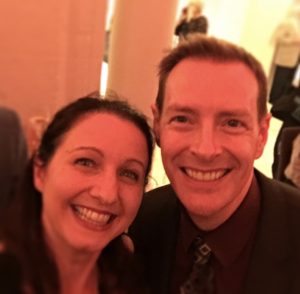
There was a session on co-writing, and there is a lot going on, much more than you would expect. That includes the bigger brand names like Clive Cussler and Wilbur Smith, who are following in the tradition of James Patterson to expand their brand offerings under the big names, as well as those writing under one name and pairings of better-known names. Indies are doing a lot more co-writing now, and this is definitely a way to get more books out there faster. I’m doing more of it myself these days.
I was also encouraged to meet new authors who I had never heard of, who are making significant amounts of money and living a creative, happy life. This is a huge industry with many small niches and a lot of voracious readers around the world, and you don’t need to be a household name to have a fantastic career with readers who love your books.
One noticeable aspect of the conference was how much older the demographic was. It might be the cost of the conference but I was one of the younger crowd at 42. So where are the younger thriller writers?
(3) The Lee Child approach vs. the Heather Graham model
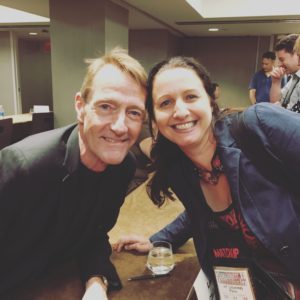
I love Lee Child’s Jack Reacher books and he is always an entertaining speaker, but Lee said at one of his sessions, “My career could not exist if I was starting today.” When he was interviewed in a separate session, he explained in more detail. His success was “a classic last era career in publishing.” His first print run was 18,000 copies and grew slightly bigger with each book. It took 5-6 books for him to break out, mainly through word of mouth in the independent bookstores. That eco-system has almost disappeared now and most publishers won’t invest in a new author for that long anymore. Lee has 21 books, all in the same series, and writes one per year.
He also said that there is, “No correlation between the quality of the book and success. Sometimes it happens, sometimes it doesn’t.”
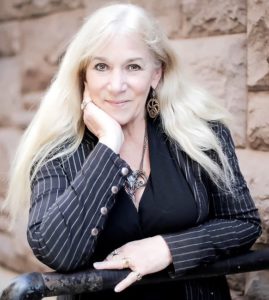
You can’t plan a career like Lee Child’s, but you can plan a career like Heather Graham’s. It means writing what you love, year after year, and building an audience slowly. I was thrilled to be on a panel with Heather as the chair because she demonstrates what is possible, and she writes supernatural thrillers, so she is a great role model.
As I’ve mentioned before on the show, I am researching investing at the moment and there are a lot of parallels to publishing. If you put a monthly amount in a low-cost index fund every month consistently for years, you can retire wealthy. (I mention the great documentary, Becoming Warren Buffett.) It’s boring, but it’s almost guaranteed. Read Unshakeable by Tony Robbins for the details. [I’m not a financial advisor, this is not advice etc etc … :)]
Or you can chase that magic stock or bet your money on an IPO or trying to invest in something that beats the market somehow. It’s like the lottery ticket of traditional publishing. It can drive you mad trying to get something that is outside of your control. So, the lesson is to just to keep creating over time because building your backlist, becoming a better writer and continuing to build your readership will pay off in years to come.
Like diet and exercise, relationships and investing, slow but steady growth is effective and won’t drive you crazy. My message to myself is: don’t be sidetracked by the possibilities of success. It’s not in your control. Focus on writing the next book and serving readers.
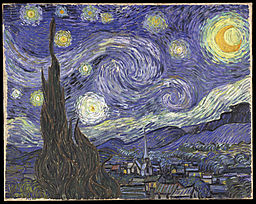
We don't know how our creative work will be received. We went to the Museum of Modern Art, which is packed full of big name artists. I go every trip to visit Starry Night by Van Gogh, and it’s the only painting with its own security guard and a queue of people wanting to take selfies with it. It’s surrounded by Picasso and Matisse and many other famous paintings, but it is this one painting that inspires adoration. There’s no way that Van Gogh would have known how it would impact people when he painted it. So keep creating and putting your art into the world, because you never know what people will love. It might be the book you haven’t written yet.
So keep creating and putting your art into the world, because you never know what people will love. It might be the book you haven’t written yet.
(4) Getting to yes. Turning browsers into book buyers.
There was a session by a data group where they presented a recently updated study on the reading habits of thriller and suspense readers.
Physical retail is in decline, a trend that I saw in New York as well as here in the high street in Bath. What physical retail there is trends towards higher profit, higher velocity goods, which books are not!
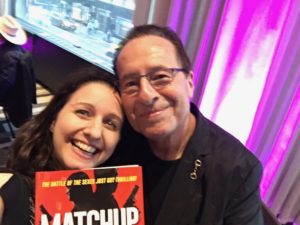
There is an increasing fragmentation of the market. There is no longer the same volume of sales for the big names and it’s harder for mid-list authors to break through. The cultural imperative around what to read has shifted and not everyone is reading the same thing anymore.
Not everyone who reads, buys. Only 1 in 3 books read are new (29%), with 52% free (libraries, giveaways, free ebooks), 11% used, 4% gift, 3% subscription. But as commitment increases, revenue increases, so turning browsers into fans is the way forward.
Discovery is broken. Even major New York Times bestsellers are not known to interested buyers, so discovery is the big challenge. Discovery sources i.e. how readers discover a book, break down as follows:
- 20% physical bookstores. This figure was previously 40% so this is a significant reduction. This was the main finding that people talked about. With physical retail in decline, how can books be discovered?
- 19% author marketing
- 11% recommendations
- 11% digital marketing
- 10% e-promotions
- 8% e-tailer browsing
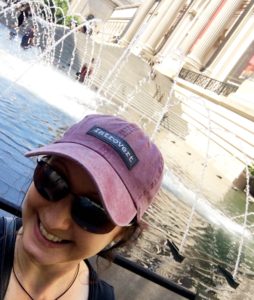
The lower the price, the lower the barrier to buy. 62% would buy a book under $2 immediately as an impulse purchase. 26% would buy a book over $16 immediately.
Conversion to buy factors, i.e. what turns an interested customer into a buyer:
- 31% book message – includes cover, title, description, category, topic, author story, branding, it ‘speaks to me’
- 26% known author/series
- 15% recommendations
- 8% special price (going up to 11% for an unknown author)
But 63% will buy if there is an author/brand/series relationship already, so the holy grail is to convert readers to true fans and maintain an ongoing relationship with them so they buy your books again and again. Indies know this and if you haven’t started an email list of readers already, get on it!
 (5) Back to the bookstore: Amazon vs. Barnes & Noble
(5) Back to the bookstore: Amazon vs. Barnes & Noble
The discussion on the decline in retail was interesting, especially as I visited the Amazon bookstore inside the Columbus Circle upmarket shopping center. It was Prime day when I went, which was hard to miss as six different people tried to sign me up even though I’m already a Prime member.
The front of the store was dominated by devices, Kindle, Fire and Alexa. You could get a discount on everything as a Prime member and you could check the prices online with a scanner. It was definitely a funnel towards online and digital with clear links into the online store.
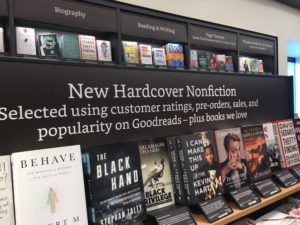
One particularly good section was the ‘If you like – you’ll also like,’ which clearly uses the Also-Boughts for data points. There were also printouts of customer reviews underneath most of the books displayed. I couldn’t find any Amazon Publishing or indie titles so I asked and they said they had no way to find out. This isn’t that surprising since the bookstores would be run by different teams, but I’d expected to at least find some APub books. In general, though, I’d recommend the store and I ended up buying, Long Story Short: The Only Storytelling Guide You’ll Ever Need by Margot Leitman.
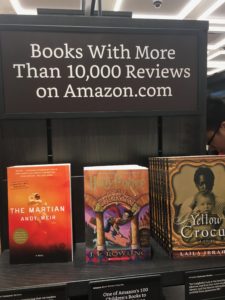
(6) Miscellaneous interesting things
“For First Blood, I set out to write an action book that didn’t feel like a genre book.” David Morrell. Use at least two other senses to bring depth to your writing, don’t concentrate on the visual all the time. When you think the book is done, change the font, print it out and edit again. All authors have tics. Figure out what they are and fix them in the second draft.
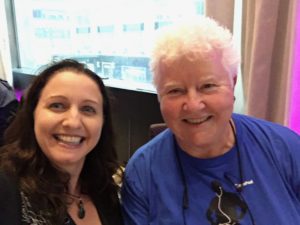
Val McDermid talked about writing her radio play, Resistance. Radio plays can be a great form of writing. Actors like doing them because they don’t have to learn the lines and they can fit them in between projects so you can get some really big names. It’s all about the words, so the writer has more control than a screenplay.
“A great thriller needs two things. Unfortunately, nobody knows what they are.” Lee Child.
He did go on to say that you need to open loops and engage human curiosity. Ask a question and then don’t answer it in order to keep the suspense going. Set up a question and don’t answer it until the end. Then add in multiple shorter arcs with smaller questions. Lee used to work in TV and said that after the remote control was invented, they would add trivia questions in before the break, so people would stick around to get the answer. This creates a narrative engine that drives the reader through the book so they have to know what happens and why.
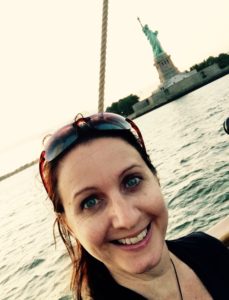
Other quotes from Lee Child. (He did a lot of sessions because he was ThrillerMaster this year.)
- On book marketing. Be a nice person. Never talk about the book. Make them like you and they are more likely to buy.
- Readers are not like us. Most people are not habitual readers. When you read as a writer, it’s not how other readers read.
- As a writer, you have to hold contradictions in your mind at the same time. Writing is an art form. Writing is a job and I have to make money with it.
- On choosing a publisher. “Go where the love is.” How you are treated is very important.
- On the constant questions about the Jack Reacher movie: “A book is the ultimate product. Anything else is secondary. A book is not a chrysalis or a pupa waiting to be something else, like a film or TV show.”
In conclusion, Thrillerfest was a challenging few days for me and as ever, it’s a regular highlight in my writing career. I meet amazing authors, I am inspired and I always learn new things. I highly recommend joining ITW if you write thrillers and the conference is fantastic. In 2018, George RR Martin will be ThrillerMaster so it will likely be a bumper year in terms of attendance. Perhaps I’ll see you there!
You can read my reports on previous years here:
- 50 things I learned at Thrillerfest 2012
- Writing thrillers. 50 lessons learned at Thrillerfest 2014
- Ambition, writing tips and being an indie at Thrillerfest 2015
You can find my thrillers in ebook, print and audiobook at www.JFPenn.com and on all the usual stores.
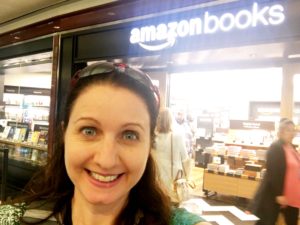 (5) Back to the bookstore: Amazon vs. Barnes & Noble
(5) Back to the bookstore: Amazon vs. Barnes & Noble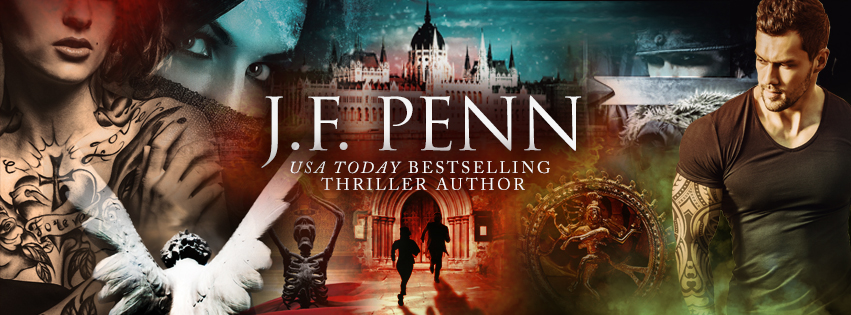


Here is a good description of the battle of Bennington in Vermont.https://www.youtube.com/watch?v=pvdefs7QuWs
Can’t figure out how to post a picture I took. I’ll try to email it to you. I’ve bought all your books non-fiction and the 3 mystery books. I listen to your podcast while driving from Golden City MO to Joplin MO.
Loved the show, thanks so much, Joanna.
Blessings,
Ethan
Thanks for sharing so honestly Joanna- really enjoyed this post and podcast and it got me thinking about my writing goals and why I do what I do. It also put into perspective that we can only control ourselves (our internal actions/ thoughts) and we cannot predict external success.
This reminded me of when you finished writing Destroyer Of Worlds, and you celebrated by…starting to write the next book in the series! You could never have predicted that this book would land you a nomination for an award (and just for the record, you are still a winner to us all!!!)
I love the analogy with diet/ exercise. Like anything worthwhile in life, it takes time and effort.
I’ve not come across Heather before but wow, opened my eyes to the fact that there are many different ways/paths to achieving ‘success’ and it all depends on what you want individually.
Thanks for sharing so openly and honestly.
Thanks Sukhi, and sometimes the reward is through reflecting on the experience and how we will do things next time 🙂
Just listening to this back episode and I heard you say you need to come up with a better ad for your audio books (as I’m writing about learning styles).
How’s this “Approximately 30% of the population predominantly learn with the Auditory style (based on the VAK learning system). When you realize this you really must buy the audio version of the Non-Fiction books.
Just out of curiosity: when you bought the book online that you were unable to buy in person at B&N, what site did you buy it from? 😜